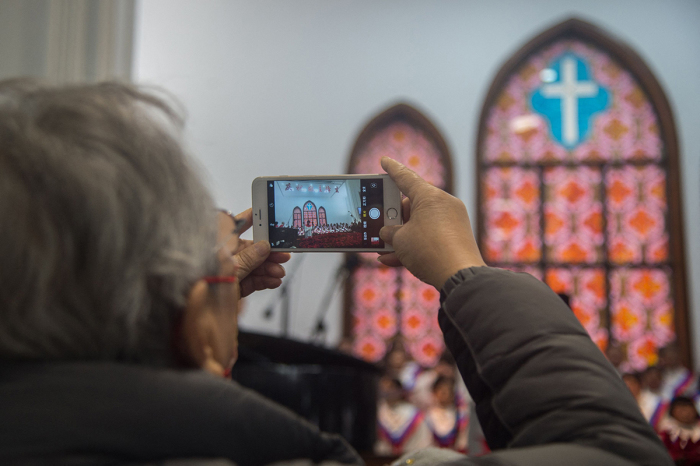Xi, Mao and CCP slogans replace Jesus, Virgin Mary in China's churches

In a sweeping overhaul of religious spaces, Chinese authorities have replaced Christian symbols with images of Communist leaders and party slogans across numerous churches in China, according to the U.S. Commission on International Religious Freedom, which points to an aggressive policy to integrate the Chinese Communist Party's ideology into religious practices.
A report from the USCIRF cites numerous instances where crosses and religious imagery were removed from churches and replaced with portraits of President Xi Jinping and the late Chairman Mao Zedong.
The change is under the ongoing “sinicization of religion” campaign, which requires religious expressions to conform to CCP ideals, according to the panel. This means that authorities have “ordered the removal of crosses from churches [and] replaced images of Jesus Christ or the Virgin Mary with pictures of President Xi,” the report said.
ChinaAid, a U.S.-based group promoting religious freedom in China, has noted that authorities in Anhui province demanded the removal of a church cross under the pretext of unspecified “safety hazards.” It reportedly had no legal basis and aligns with a larger pattern of reducing Christian symbols in favor of party propaganda.
According to the USCIRF’s report, there are directives for churches to exhibit CCP slogans at their entrances and swap traditional Christian teachings with state-approved narratives.
For example, a church in Jiangxi province was compelled to replace a painting of the Virgin Mary with an image of Xi. Another instance showed photographs of Xi and Mao integrated into the structure of a cross.
“Chinese authorities attempt to exert total control over religion through an extensive, complicated web of state laws, regulations, and policies that the CCP and various government agencies enforce,” states the USCIRF report.
“At the center of the CCP’s institutional control of religion are seven state-controlled national religious organizations, often referred to as ‘patriotic religious associations,’ and their local branches,” it explains. “These are the Buddhist Association of China (BAC), the Chinese Taoist Association (CTA), the Chinese Catholic Patriotic Association (CCPA) and Bishops’ Conference of the Catholic Church in China (BCCCC), the Protestant Three-Self Patriotic Movement (TSPM) and China Christian Council (CCC), and the Islamic Association of China (IAC).”
The campaign gained momentum in 2018 with revised regulations that aim to bring religious groups under tighter government control, noted The Telegraph. This included the endorsement of CCP-approved religious materials and the modification of religious teachings to reflect CCP doctrines.
Reports from local media and human rights organizations indicate that such practices have become increasingly prevalent, affecting not only Christians but also Muslims, Buddhists and followers of other religions.
The USCIRF report says that all aspects of religious life in China are being molded to adhere to CCP ideology, with any religious elements deemed contrary to the state’s political agenda being actively eliminated.
“Underground” churches and house churches that operate without state approval face severe consequences, including shutdowns, surveillance and the arrest of prominent religious leaders. Moreover, all children younger than 18 are prohibited from receiving any form of religious education, a policy strictly enforced by authorities.
The repercussions of these policies are significant, with many believers having to significantly alter their practices.
Christians, for example, have had to resort to smaller, more secretive gatherings to evade detection and penalties.
USCIRF Commissioner Asif Mahmood told Catholic News Agency that the CCP views underground Catholics as a threat due to their rejection of the government’s claimed authority to control religious doctrine and manage religious activities.
In response to the USCIRF report, a spokesman for the Chinese Embassy in London rejected the findings, labeling them as ideological bias and an interference in China’s domestic affairs, according to the Telegraph.
The embassy claimed that China protects the freedom of religious belief as prescribed by law.
However, personal accounts from Chinese Christians reveal a noticeable increase in state surveillance and interference in religious activities, particularly following the regulatory changes in 2018. These measures have disrupted traditional religious practices and led to a significant exodus of religious adherents seeking freedom from persecution.




























